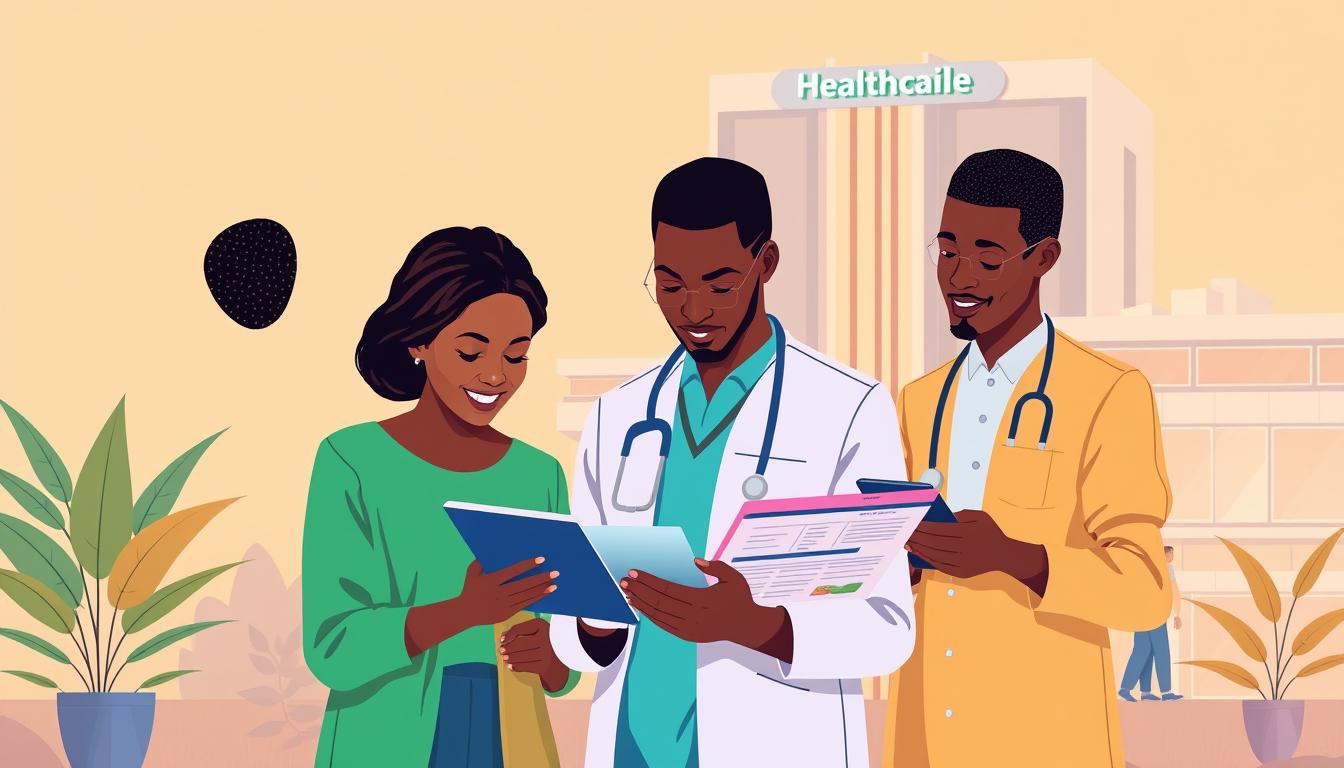Did you know that millions of Nigerian families lack access to affordable health coverage? Securing reliable health protection is crucial for your family’s well-being. In 2025, various options are available that cater to different needs and budgets.
This article will guide you through the current state of health coverage in Nigeria, helping you understand your needs and explore government-sponsored programs and private insurance options.
Key Takeaways
- Understanding the current state of health coverage in Nigeria
- Exploring government-sponsored health programs
- Private insurance options for Nigerian families
- Factors to consider when choosing a health plan
- Tips for securing affordable health coverage
The Current State of HEALTH INSURANCE in Nigeria
The current state of health insurance in Nigeria is complex and multifaceted. Nigeria’s healthcare system is evolving, with health insurance playing a vital role in ensuring that families have access to quality healthcare.
Overview of Nigeria’s Healthcare System
Nigeria’s healthcare system is a mix of public and private providers. The public healthcare system faces challenges such as inadequate infrastructure and staffing shortages. In contrast, private healthcare providers offer better facilities and services but at a higher cost. Health insurance is crucial in bridging this gap by making healthcare more affordable.
Challenges Facing Nigerian Families Seeking Coverage
Nigerian families face several challenges when seeking health insurance coverage. These include high premium costs, limited coverage options, and a lack of awareness about available health insurance plans. Additionally, many Nigerians rely on out-of-pocket payments, which can lead to financial hardship in the event of unexpected medical expenses.
2025 Projected Changes in the Nigerian Health Sector
The Nigerian health sector is expected to undergo significant changes in 2025. Projected changes include improvements in healthcare infrastructure, increased access to health insurance, and enhanced regulatory frameworks. These changes aim to make healthcare more accessible and affordable for Nigerian families.
As Nigeria’s healthcare landscape continues to evolve, it is essential for families to stay informed about the latest developments in health insurance. By understanding the current state of health insurance and the projected changes, Nigerian families can make informed decisions about their healthcare needs.
Understanding Health Insurance Needs for Nigerian Families

The diverse needs of Nigerian families demand a tailored approach to health insurance. Nigerian families have varying health insurance needs based on factors such as family size, age, and health status.
Essential Coverage Requirements
Nigerian families require health insurance that covers essential medical services, including hospital stays, surgical procedures, and outpatient care. Comprehensive coverage is vital to protect against financial hardship due to medical expenses.
Balancing Cost and Benefits
Balancing the cost of health insurance premiums with the benefits provided is a critical consideration. Families must weigh the trade-offs between premium costs and coverage limits, deductibles, and copays. As one expert notes,
“The key is finding a balance between affordability and adequate coverage.”
Special Considerations for Multi-generational Families
Multi-generational families have unique needs, including coverage for elderly family members who may require more medical care. Insurance plans that cater to these needs can provide peace of mind and financial protection.
By understanding these factors, Nigerian families can make informed decisions about their health insurance needs.
Government-Sponsored Health Insurance Programs
Nigerian families can now benefit from government-sponsored health insurance programs designed to make healthcare more accessible. These programs are crucial in ensuring that families have financial protection against medical expenses.
National Health Insurance Scheme (NHIS) Updates for 2025
The NHIS has introduced significant updates in 2025, expanding its coverage and improving benefits. These updates aim to increase enrollment and provide more comprehensive care. The scheme now includes additional services such as preventive care and chronic disease management.
State Health Insurance Programs
In addition to the NHIS, some states offer their own health insurance programs. These programs are designed to meet the specific needs of the state’s population.
Eligibility Criteria
Eligibility for state health insurance programs varies, but generally includes low-income families and individuals. It’s essential to check the specific criteria for each state program.
Coverage Benefits
State health insurance programs offer a range of benefits, including outpatient services, hospital stays, and sometimes additional services like dental and optical care.
Affordability Measures and Subsidies
To make these programs more affordable, the government offers subsidies to low-income families. These subsidies significantly reduce the premium costs, making health insurance more accessible.
Private Health Insurance Options in Nigeria
In 2025, Nigerian families can expect a variety of private health insurance plans tailored to their needs. Private health insurance offers a range of benefits, including access to quality healthcare and financial protection against medical expenses.
Leading Insurance Providers and Their 2025 Plans
Several leading insurance providers in Nigeria are enhancing their offerings in 2025. For instance, AIICO Insurance and Leadway Assurance are among the top providers offering comprehensive health insurance plans.
Comparing Premium Costs
Premium costs vary significantly among providers. The following table compares the premium costs of different insurance plans:
| Insurance Provider | Basic Plan | Premium Plan |
|---|---|---|
| AIICO Insurance | ₦150,000 | ₦500,000 |
| Leadway Assurance | ₦180,000 | ₦600,000 |
| Other Providers | ₦120,000 – ₦200,000 | ₦450,000 – ₦700,000 |
Coverage Limitations and Benefits
Understanding the coverage limitations and benefits is crucial. Most plans cover outpatient and inpatient services, but some may have limitations on certain treatments or have additional benefits like dental and optical care.
Budget-Friendly Plans for Different Income Levels
Insurance providers are now offering budget-friendly plans to cater to different income levels. For example, microinsurance plans are available for low-income families, providing basic coverage at affordable rates.
Health Insurance Options for Nigerian Families in the United States

As Nigerian families settle in the US, understanding their health insurance options becomes crucial. The US health insurance system is multifaceted, offering various plans to cater to different needs.
US Health Insurance System Overview for Immigrants
The US health insurance system is primarily employer-based, but there are also government-sponsored programs and individual plans available. Nigerian immigrants need to understand these options to make informed decisions.
Affordable Care Act Options for Nigerian Families
The Affordable Care Act (ACA) provides an opportunity for Nigerian families to secure health insurance. Subsidies are available to make premiums more affordable for eligible families.
Employer-Sponsored Coverage Considerations
Many Nigerian immigrants are employed in jobs that offer health insurance. Understanding the terms of employer-sponsored coverage is essential to ensure it meets their family’s needs.
Medicaid and CHIP Eligibility for Nigerian Immigrants
Nigerian families with lower incomes may be eligible for Medicaid or the Children’s Health Insurance Program (CHIP). These programs provide comprehensive coverage at little to no cost.
| Insurance Option | Eligibility Criteria | Key Benefits |
|---|---|---|
| Affordable Care Act | Income level, family size | Subsidized premiums, comprehensive coverage |
| Employer-Sponsored | Employment status | Group rates, often more affordable |
| Medicaid/CHIP | Income level, family size, residency | Low or no cost, comprehensive coverage |
Community-Based and Micro Health Insurance Schemes
Community-based health insurance schemes are emerging as a vital solution for Nigerian families, especially in rural areas. These programs are designed to provide affordable health coverage to families who may not have access to traditional insurance plans.
How Community Health Plans Work
Community health plans operate on a mutual aid principle, where members pool their resources to cover medical expenses. This approach allows families to share the risk and benefit from collective bargaining power when negotiating with healthcare providers.
Success Stories and Implementation
Several community-based health insurance schemes have shown promising results in Nigeria. For instance, some programs have achieved high enrollment rates and reduced healthcare costs for participating families. Successful implementation often involves partnerships with local organizations and healthcare providers.
Low-Cost Alternatives for Rural Families
Micro health insurance schemes offer low-cost alternatives for rural families. These plans are tailored to meet the specific needs of rural communities, providing essential health coverage at an affordable price. Low-cost alternatives are crucial for rural families who often face significant barriers to accessing healthcare.
By leveraging community-based and micro health insurance schemes, Nigerian families can access necessary healthcare services without facing financial hardship. These innovative solutions are particularly beneficial for rural families who may be underserved by traditional insurance providers.
Digital Health Insurance Innovations in 2025
Digital health insurance is evolving rapidly in 2025, with innovations that promise to make healthcare more accessible and affordable for Nigerian families. These advancements are transforming the healthcare landscape, providing new opportunities for families to manage their health insurance needs effectively.
Mobile Health Insurance Platforms
One of the significant innovations is the development of mobile health insurance platforms. These platforms allow users to manage their insurance policies, access healthcare services, and make payments directly from their mobile devices.
Telemedicine Integration with Insurance
Telemedicine integration with health insurance is another critical development. This integration enables policyholders to access remote healthcare services, reducing the need for physical hospital visits and making healthcare more convenient.
Key Features of Digital Health Insurance Innovations
| Innovation | Benefits |
|---|---|
| Mobile Health Insurance Platforms | Easy policy management, accessible healthcare services |
| Telemedicine Integration | Remote healthcare access, reduced hospital visits |
| Pay-as-you-go Options | Flexible payment plans, improved affordability |
| AI-Driven Cost Reduction | Lower premiums, enhanced cost efficiency |
Pay-as-you-go and Flexible Payment Options
Pay-as-you-go and flexible payment options are making health insurance more manageable for Nigerian families. These options allow policyholders to adjust their payments according to their financial situation.
AI-Driven Cost Reduction Strategies
AI-driven cost reduction strategies are being implemented to make healthcare more affordable. By leveraging AI, insurance providers can streamline processes, reduce administrative costs, and pass the savings on to policyholders.
Conclusion: Securing Your Family’s Health Future
Nigerian families can now make informed decisions about their health insurance options in 2025. With various plans available, choosing the right coverage is crucial for a healthier tomorrow. By understanding the current state of health insurance in Nigeria and exploring government-sponsored, private, and community-based options, families can secure their health future.
Digital innovations, such as mobile health insurance platforms and telemedicine integration, are also transforming the industry. When selecting a plan, consider essential coverage requirements, balancing cost and benefits, and special considerations for multi-generational families. By doing so, Nigerian families can ensure they are securing their family health and building a stronger future.
FAQ
What is the National Health Insurance Scheme (NHIS), and how does it work?
The NHIS is a government-sponsored health insurance program that provides affordable healthcare coverage to Nigerian families. It works by pooling funds from various sources, including government subsidies and individual contributions, to cover medical expenses.
How do I choose the right health insurance plan for my family?
To choose the right health insurance plan, consider factors such as your family’s health needs, budget, and the coverage benefits offered by different plans. It’s essential to compare premium costs, coverage limitations, and benefits to make an informed decision.
Are there health insurance options available for Nigerian families in rural areas?
Yes, community-based and micro health insurance schemes offer low-cost alternatives for rural families. These plans are designed to be more accessible and affordable for families in rural areas.
Can Nigerian families in the United States access health insurance?
Yes, Nigerian families in the United States can access health insurance through various options, including the Affordable Care Act, employer-sponsored coverage, Medicaid, and CHIP.
How do digital health insurance innovations improve healthcare access?
Digital health insurance innovations, such as mobile health insurance platforms and telemedicine integration, make healthcare more accessible and convenient. Pay-as-you-go and flexible payment options also make health insurance more manageable.
What are the benefits of private health insurance plans in Nigeria?
Private health insurance plans in Nigeria offer a range of benefits, including access to quality healthcare, financial protection, and flexibility in choosing healthcare providers.
How do I determine if I’m eligible for government-sponsored health insurance programs?
Eligibility criteria for government-sponsored health insurance programs, such as the NHIS, vary depending on factors such as income level, family size, and employment status. You can check with the relevant authorities or insurance providers to determine your eligibility.
Can I customize my health insurance plan to suit my family’s needs?
Yes, many health insurance providers offer customizable plans that allow you to tailor your coverage to your family’s specific needs and budget.
